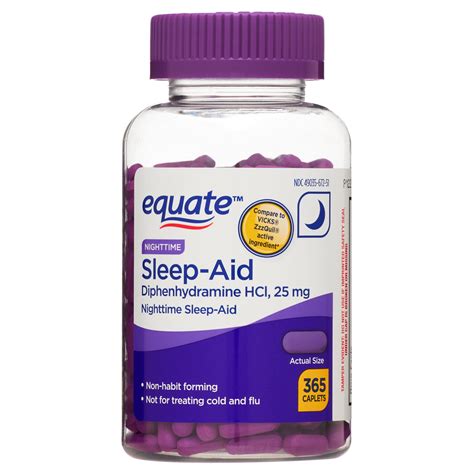Benadryl Sleep Aid

Sleep is a fundamental aspect of human life, crucial for physical and mental health. However, achieving quality sleep can be elusive for many, leading to the exploration of various sleep aids. One such aid that has garnered attention and use is Benadryl, known generically as diphenhydramine. Originally marketed as an antihistamine for allergy relief, Benadryl has found off-label use as a sleep aid due to its sedative properties. This article delves into the specifics of using Benadryl as a sleep aid, its effects, potential risks, and whether it’s a recommended long-term solution for sleep issues.
Understanding Benadryl
Benadryl, or diphenhydramine, is a first-generation antihistamine that works by blocking the action of histamine, a substance in the body that causes allergy symptoms. However, one of the side effects of diphenhydramine is drowsiness, which has led to its use as a sleep aid. It’s available over-the-counter (OTC) in various forms, including tablets, capsules, and liquids, making it easily accessible for those seeking relief from sleeplessness.
How Benadryl Affects Sleep
The sedative effect of Benadryl can help individuals fall asleep faster, especially if their sleep issues are related to allergies or if they are experiencing occasional sleeplessness. However, it’s essential to understand that Benadryl doesn’t improve sleep quality in the long term. It can lead to lighter, less restorative sleep, and users may experience grogginess the next day, a phenomenon known as a “hangover effect.” This hangover effect is more pronounced in older adults and can impair cognitive and motor functions, potentially leading to accidents or injuries.
Potential Risks and Side Effects
While Benadryl might provide temporary relief for sleep, its use comes with several risks and side effects, especially with prolonged or frequent use. Some of these include:
- Dependence and Withdrawal: Regular use can lead to dependence, and stopping the medication abruptly can result in withdrawal symptoms such as insomnia, tremors, and anxiety.
- Cognitive Impairment: Diphenhydramine can impair cognitive function, including attention, memory, and decision-making skills, particularly in older adults.
- Dry Mouth and Urinary Retention: Anticholinergic side effects like dry mouth, constipation, and urinary retention can be bothersome.
- Rebound Insomnia: The body can become accustomed to the drug, leading to rebound insomnia, where the individual finds it even harder to sleep without the medication.
Alternatives to Benadryl for Sleep
Given the potential risks associated with Benadryl, especially for long-term use, it’s crucial to explore safer alternatives for addressing sleep issues. These can include:
- Melatonin: A hormone that regulates sleep-wake cycles, available in supplement form.
- Valerian Root: A natural herb known for its sedative properties.
- Prescription Sleep Aids: For more severe insomnia, prescription medications or sleep aids under a doctor’s guidance can be more effective and safer.
- Lifestyle Changes: Establishing a consistent sleep schedule, creating a sleep-conducive environment, avoiding caffeine and electronics before bedtime, and engaging in regular physical activity can significantly improve sleep quality.
Best Practices for Using Benadryl as a Sleep Aid
If you still choose to use Benadryl for sleep, consider the following guidelines to minimize risks:
- Use the Lowest Effective Dose: Take the smallest amount that helps you fall asleep to reduce side effects.
- Short-Term Use Only: Limit use to occasional sleeplessness. Chronic use can lead to dependence and worsen sleep quality.
- Consult a Doctor: Especially if you’re considering using Benadryl for sleep in children, older adults, or if you have underlying health conditions.
- Monitor Side Effects: Be aware of potential side effects and adjust your use accordingly.
Conclusion
While Benadryl can provide temporary relief for sleep issues due to its sedative properties, its use as a long-term sleep aid is not recommended due to potential risks, including dependence, cognitive impairment, and rebound insomnia. For those struggling with sleep, exploring safer alternatives, whether through lifestyle adjustments, natural supplements, or under the guidance of a healthcare professional, is advisable. Quality sleep is crucial for overall health, and finding a safe, effective method to achieve it is essential for wellbeing.
Is Benadryl safe for long-term use as a sleep aid?
+No, Benadryl is not recommended for long-term use as a sleep aid due to risks of dependence, cognitive impairment, and other side effects, especially in older adults.
What are safer alternatives to Benadryl for sleep?
+Safer alternatives include melatonin supplements, valerian root, prescription sleep aids under medical guidance, and lifestyle changes such as maintaining a consistent sleep schedule and sleep-conducive environment.
How does Benadryl affect sleep quality?
+Benadryl can help individuals fall asleep faster but does not improve sleep quality. It can lead to lighter, less restorative sleep, and users may experience a hangover effect the next day.



